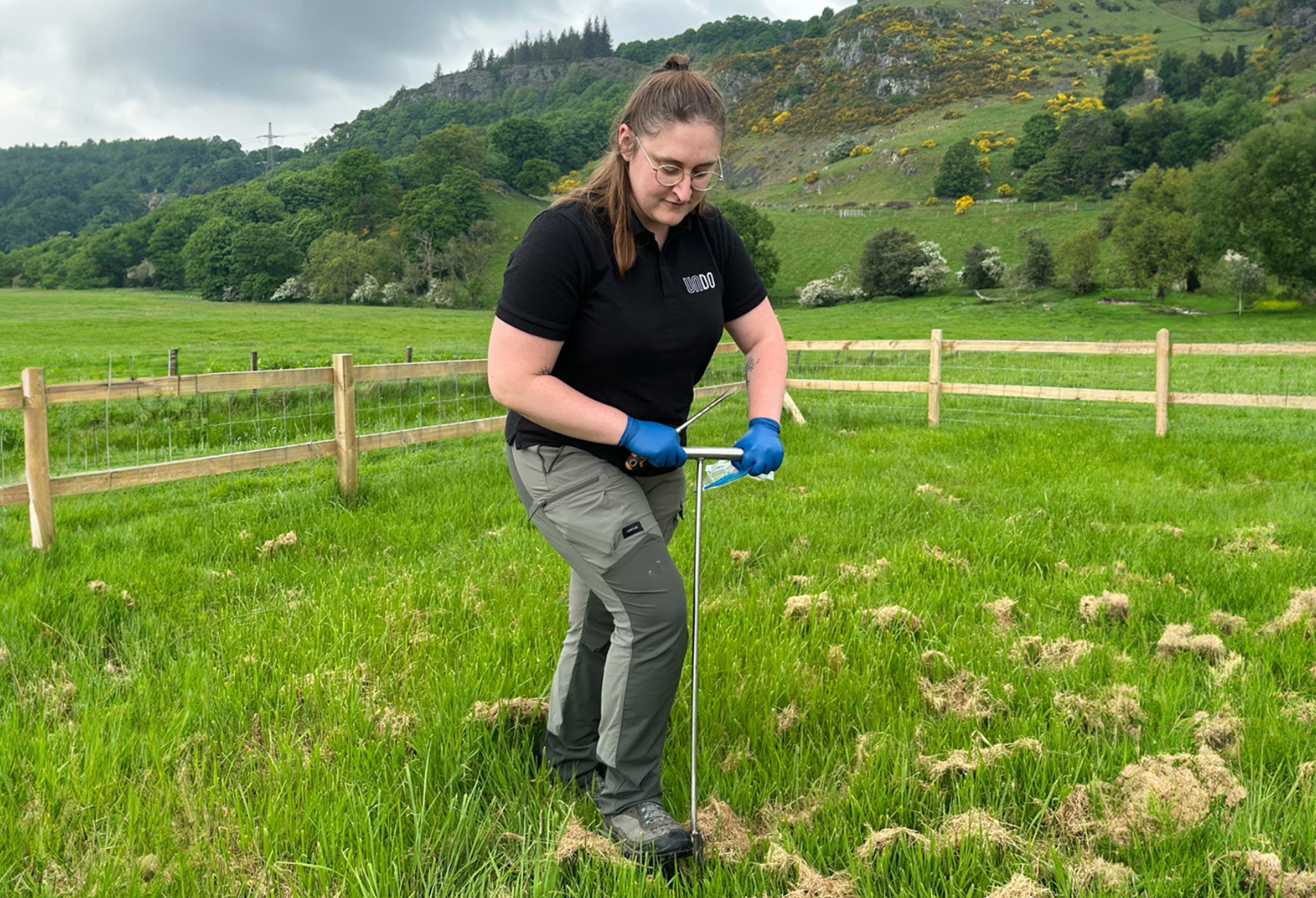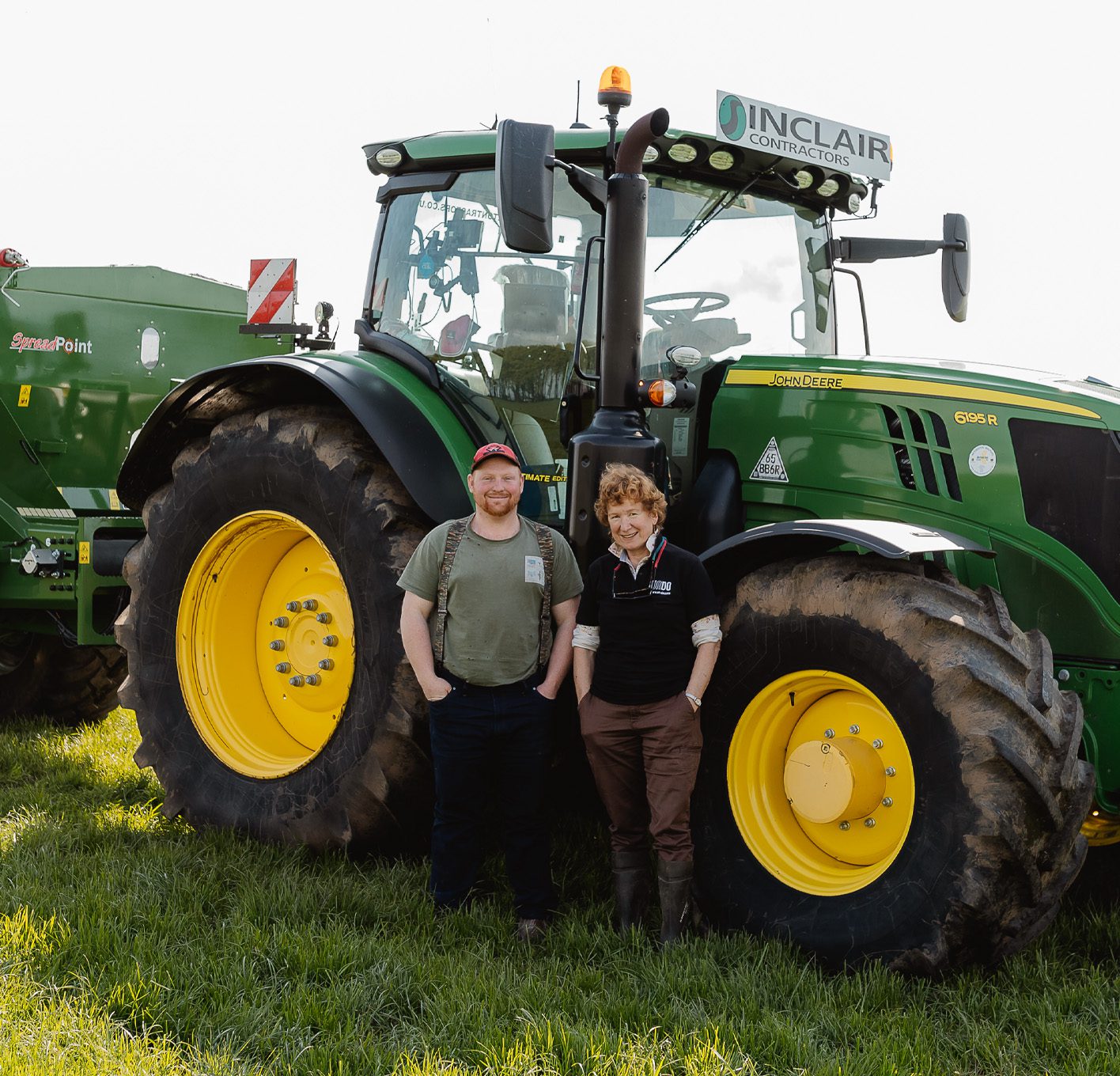A well-known part of the Scottish psyche is impermanence. We believe everything changes and nothing good lasts forever. After growing up in a coastal town in the southwest of Scotland, you could say that I’m used to the turbulent, torrential typhoons that we call “weather”. Early in life, I came to the conclusion that only the rain is a safe expectation. Or so I thought…
As a field technician with UNDO, I’m on the scientific front lines of enhanced rock weathering. I joined in early 2023 because I adore being outside in nature and getting my hands dirty. Sitting behind a screen hurts my head, so a job working in the beautiful countryside, collecting soil and soil pore water samples (or “digging holes” as my in-laws like to describe it) seemed like a perfect match for me.
Spring 2023: Preparing for Enhanced Rock Weathering Field Trials
I had everything in place for a successful start at my new job. My checklist included:
– Abundant stores of crushed basalt rock, a by-product of the quarry and mining industry
– Trial sites on different soil textures and crops
– User-friendly and easy-to-install sampling equipment
– Beautiful scenery to look at while having lunch
– Rain
Summer 2023: Record-Breaking Heatwave Hampers Soil Sampling Efforts
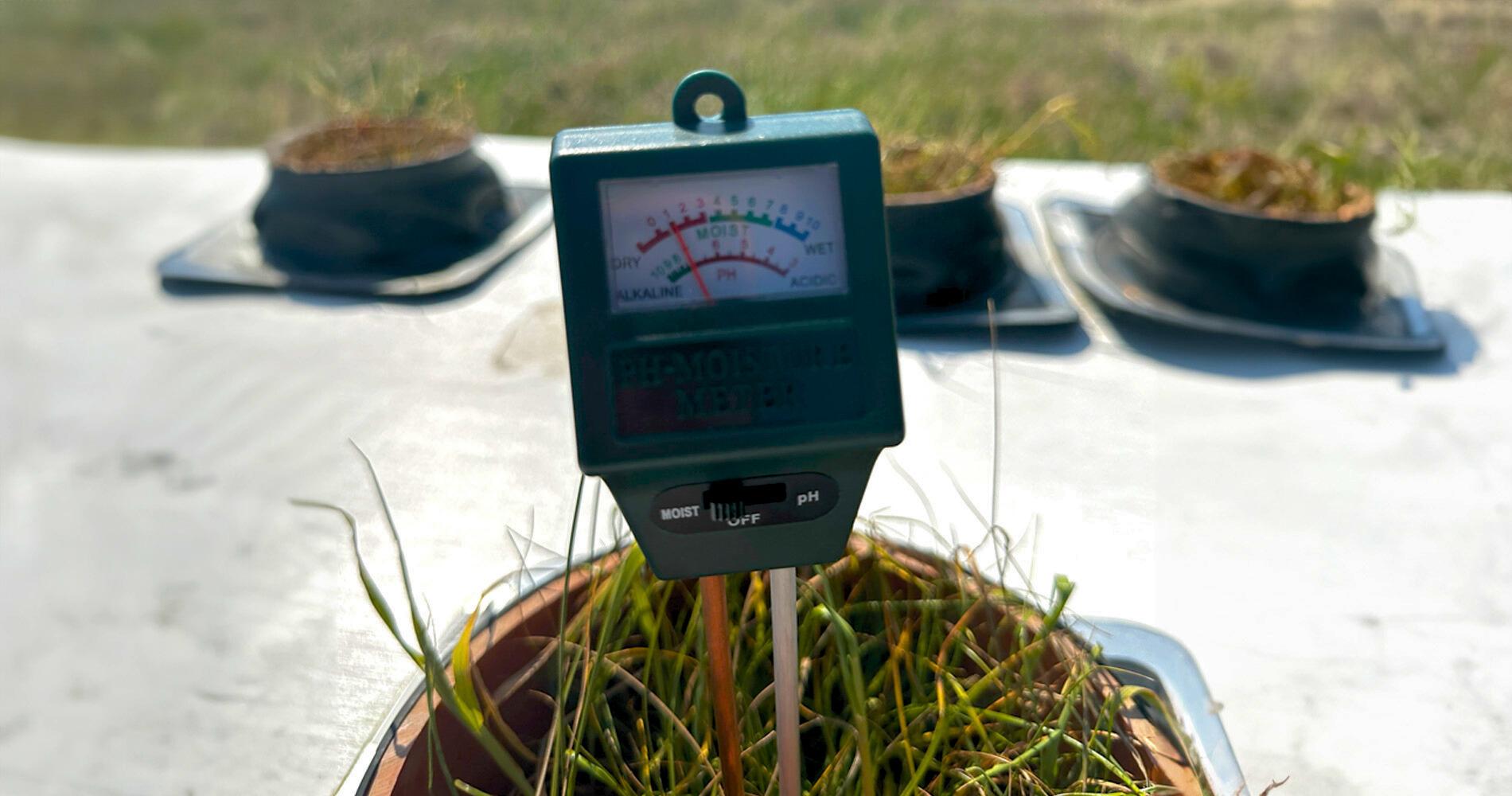
Photo: A soil moisture probe inserted into one of our mesocosm experiment cores, taken on 13th June 2023.
A persistent heatwave in the North Atlantic contributed to record-breaking temperatures and was declared severe in mid-June which brought further soaring temperatures for the UK. Although I got the best tan a near-reflective translucent Scot like myself could get, more often than not I was collecting empty sample after empty sample. Since there was no soil pore water to be extracted, I turned my head to focus on “digging holes” – or soil sampling.
After months of little to no pore water, dead grass and cracked, compromised soils, action had to be taken. We installed larger macro-rhizon pore water samplers, thin plastic tubes that are used for repeated and reliable sampling of all dissolved components in soil solution, in our mesocosms. We established more trials and altered our experiments to include new irrigation systems. Everything was looking up until autumn crept up on us.
Autumn 2023: Storm Babet Devastates Soil Trials Across Scotland
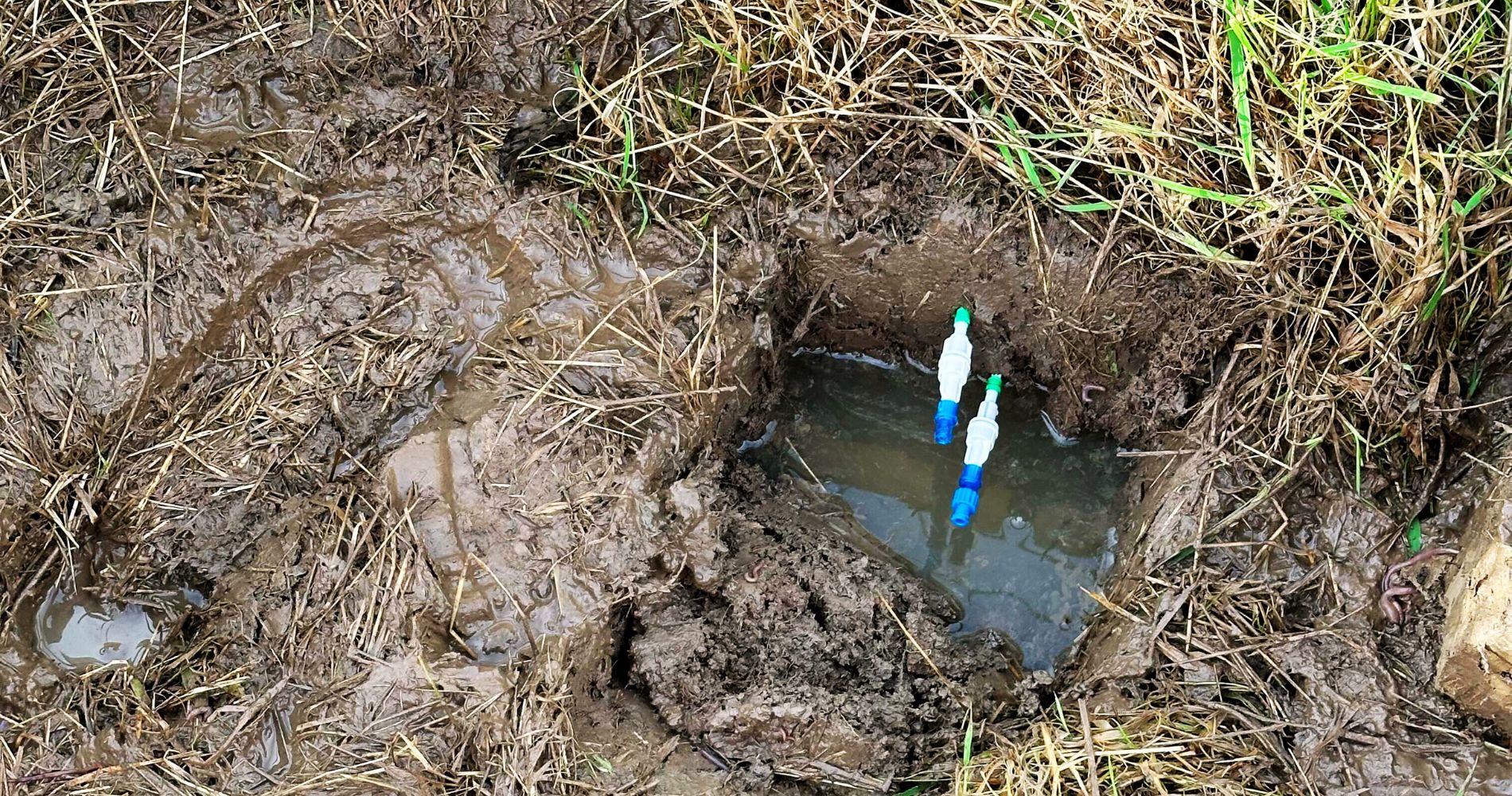
Photo: Installation of replacement macro-rhizons after some voles ate the tubing for dinner. Flood water in the heavy-clay soil had to be bailed out intermittently during installation. Taken 13th November 2023.
Storm Babet (18th-21st October 2023) was one of the worst storms I have seen in my life. Freezing-cold frosts had come right after a very long and scorching summer. It was like a glitch in the matrix.
On some days, the field team were grounded at home, being unable to travel to sites to carry out fieldwork. UNDO’s operations team was unable to carry out spreading. In Aberdeenshire, near our Glensaugh lab, hundreds of fields were completely destroyed. Mud and debris had washed onto every road, even the motorway, causing traffic accidents and congestion that would last for days. The damage caused to the roads was severe, with gullies and unavoidable vehicle-destroying potholes everywhere. Widespread crop and livestock losses were reported. I remember a conversation with a farmer who told me that he had been missing sheep for days. A neighbour had finally alerted him that they had been found dead in his tree.
After multiple severe flood warnings were issued, seven people were reported to have died as a result of the storm. This storm would be the beginning of one of the wettest winters on record.
When things are going well, we can always rely on the rain to spoil things, but what was not expected was that the torrential rain of the autumn made the soils unworkable and still I could not get samples! Pore water ebbed and flowed but soil sampling was nearly impossible and soul-destroying work.
As you can imagine, the drying and processing of these soil samples took much longer than usual. Despite this, we were finally able to see some increased volumes in our extracted pore water. You may utter a very brief “Hurrah!”
Winter 2023/24: Overcoming Challenges of Frozen Soil and Pore Water Sampling
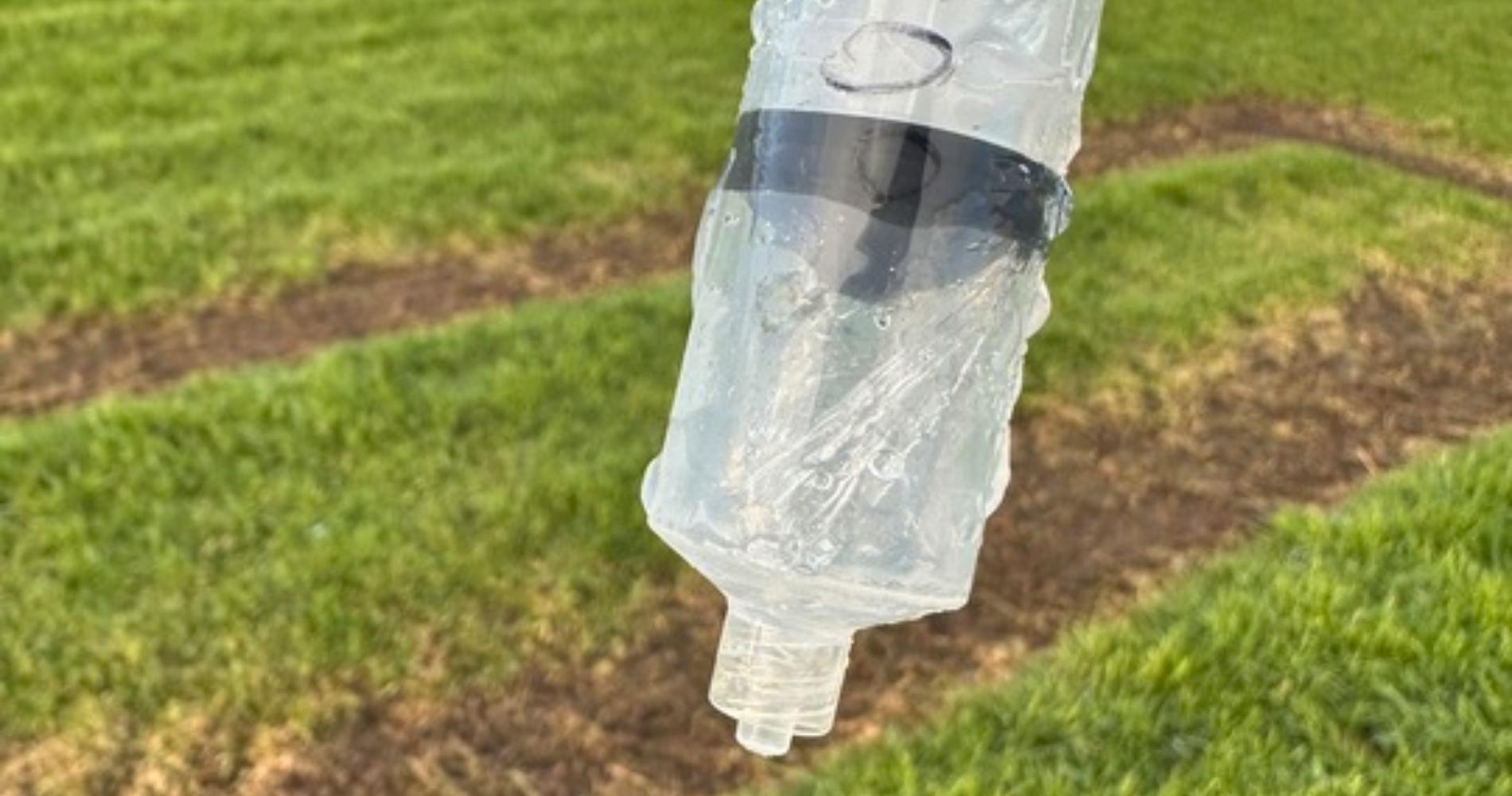
Photo: Frozen pore water in our extraction syringes. Taken 8th December 2023.
As temperatures started to plummet, we were back to having no soil samples due to rock-solid frozen ground. It was during this period that we faced the most issues. Pore water collections were heavily affected: water was freezing in the syringes and inside the connected tubing buried underground. We’d sometimes find that our equipment had snapped off due to freeze-thaw. We would have a full syringe one week and a broken one the next. Constant removal and reinstallation became the number one maintenance job over the winter period.
Whilst the north-east of Scotland was still in almost permafrost conditions, the rest of the country started to recover. I took the weather respite as a sign that I’d be able to drive directly onto our Longnewton trial site, as I had in June of 2023 without any issues. Perhaps on this day, I was overly optimistic about the ground conditions. My vehicle got stuck in the mud and I had to call for help. The field was waterlogged, and soil sampling was extremely difficult. And of course, this happened right before we celebrated Women in STEM here at UNDO.
Other colleagues were much more successful that week. Due to the heavy snow and flooded roads, some of us were again left housebound. My dedicated colleague, Morven, even took work home with her and processed soil in her dad’s shed!
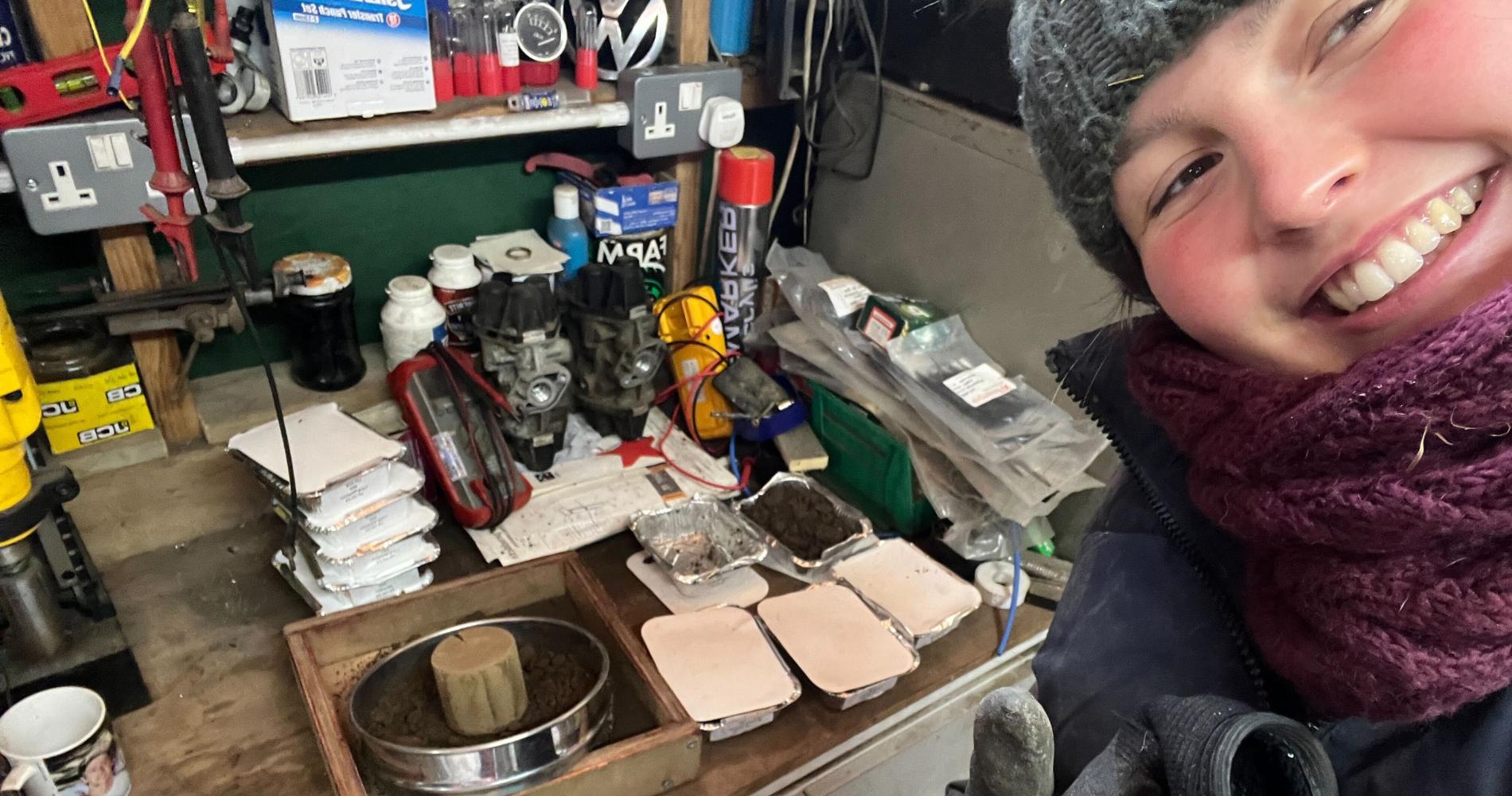
Photo: Morven processing soil in her Dad’s shed. Taken 15th January 2024.
Factors for Successful MRV in Enhanced Rock Weathering
While soil moisture and temperature are the main factors that determine whether or not I have a good day in the field, other underlying factors impact successful sample collection and trial maintenance including:
– Soil compaction
– Soil texture
– Unexplained loss of vacuum in sampling equipment
– Destruction of sampling equipment (by birds, rabbits, deer, voles)
While we have still managed to get sufficient data, it is much less than we were originally hoping for. This has prompted conversations around new and improved methods of sampling, collection and data presentation within UNDO. It has also catalysed the creation of a highly innovative but robust method, which meets our Measurement, Reporting and Validation (MRV) requirements and can be used throughout the year, in different countries with varying soil classifications, with or without rainfall.
Fighting the Headwinds of Climate Change
Reflecting on my year with UNDO, I naively expected rain in normal Scottish weather patterns throughout the year, and while the summer was not to my expectations, the winter completely exceeded them. It is ironic, irritating and also extremely worrying that after periods of heavy rainfall, we still struggle to extract pore water in Scottish soils. Climate change impacts every corner of the globe and I’ve observed drastic changes in my environment first-hand. It is even more obvious in a field-based job.
This is a recent headline in The Guardian: “Scottish ministers called ‘short-termist’ after scrapping carbon emissions pledge”. It details how the Scottish Government has decided to abandon its target to cut greenhouse gas emissions by 75% by 2030. Despite this development for a country that is a “world leader in sustainability”, UNDO is committed to helping Scotland and the UK meet the United Nations Sustainable Development Goals by spreading enough rock by 2025 to remove one million tonnes of CO2 through enhanced rock weathering. My belief is that UNDO is an example of an optimistic, science-driven team pioneering permanent carbon removal for a greener future.
This is the third blog in our “Science and MRV of ERW” series.
If you missed Director of Innovation Rob Palmer’s blog on the financial challenges of MRV, click here. To start with the first instalment introducing MRV in ERW by Director of Science and Research, XinRan Liu, click here.
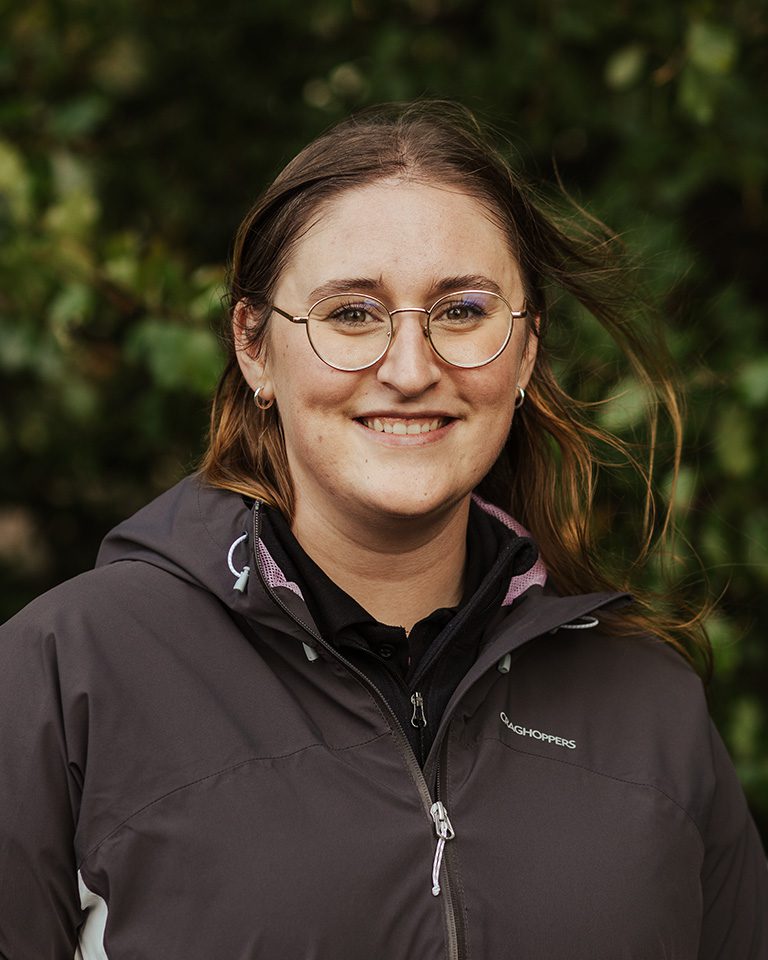 " alt="">
" alt="">
Amy manages Dumyat's mesocosms and Auchincruive trials, merging field collection with lab analysis. With a degree in Geography and Environmental Science from Dundee, she explored climate change effects on E.coli in Scottish waters. Previously a Geo-Environmental Technician, Amy's expertise strengthens our environmental assessments.
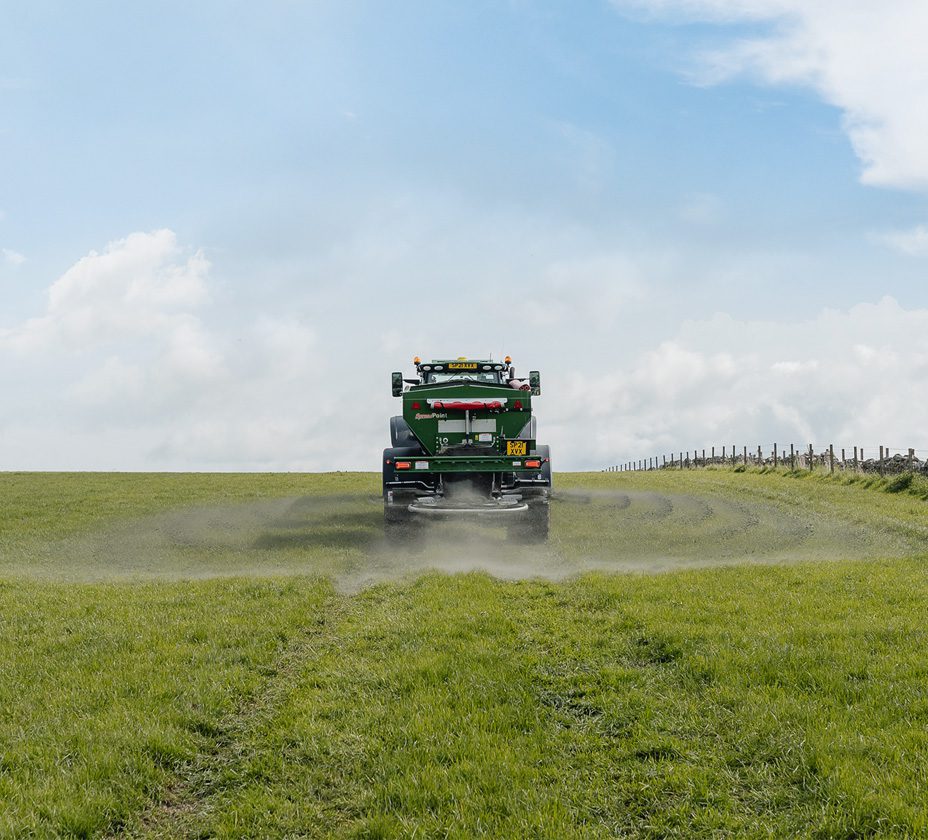
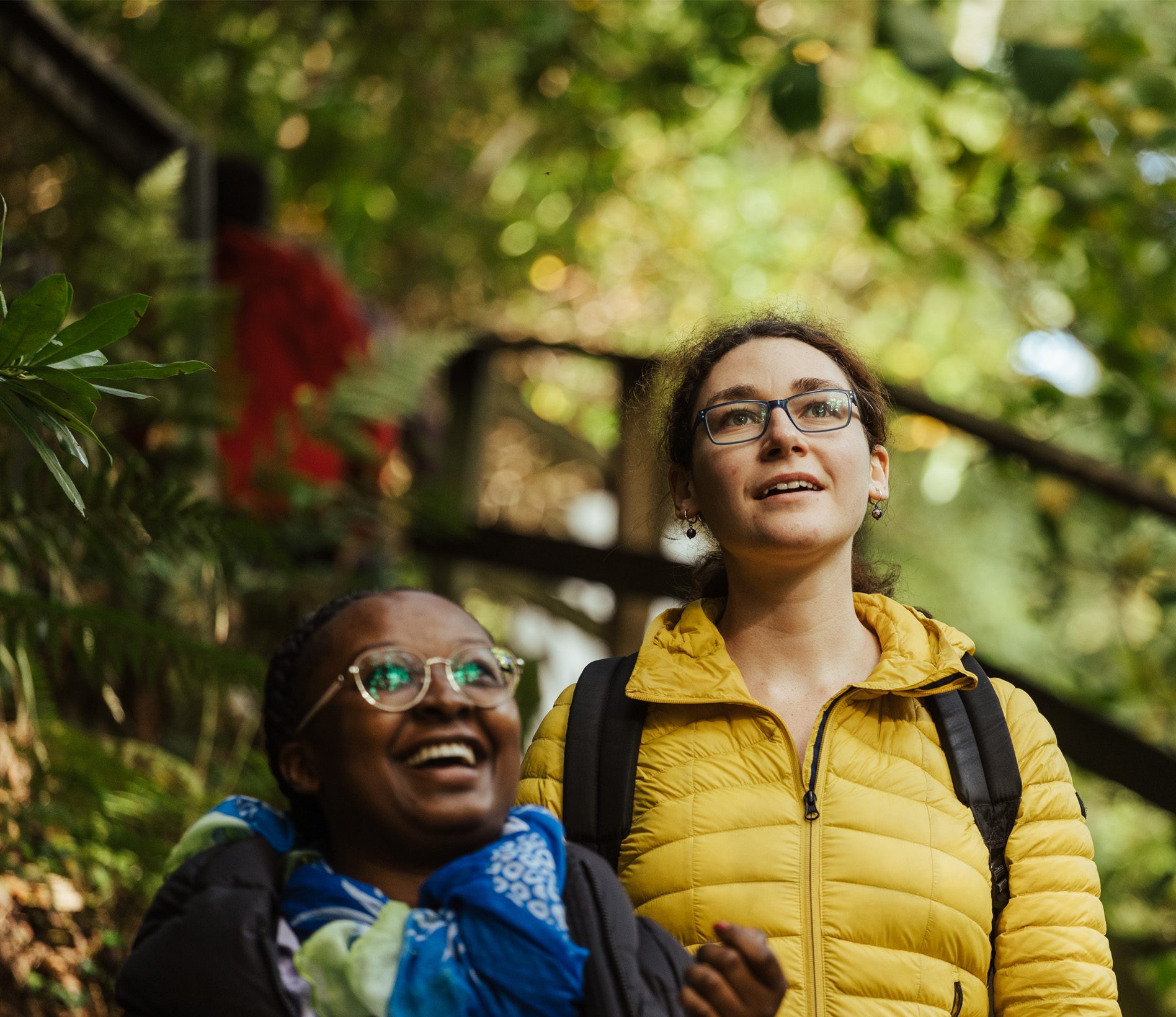
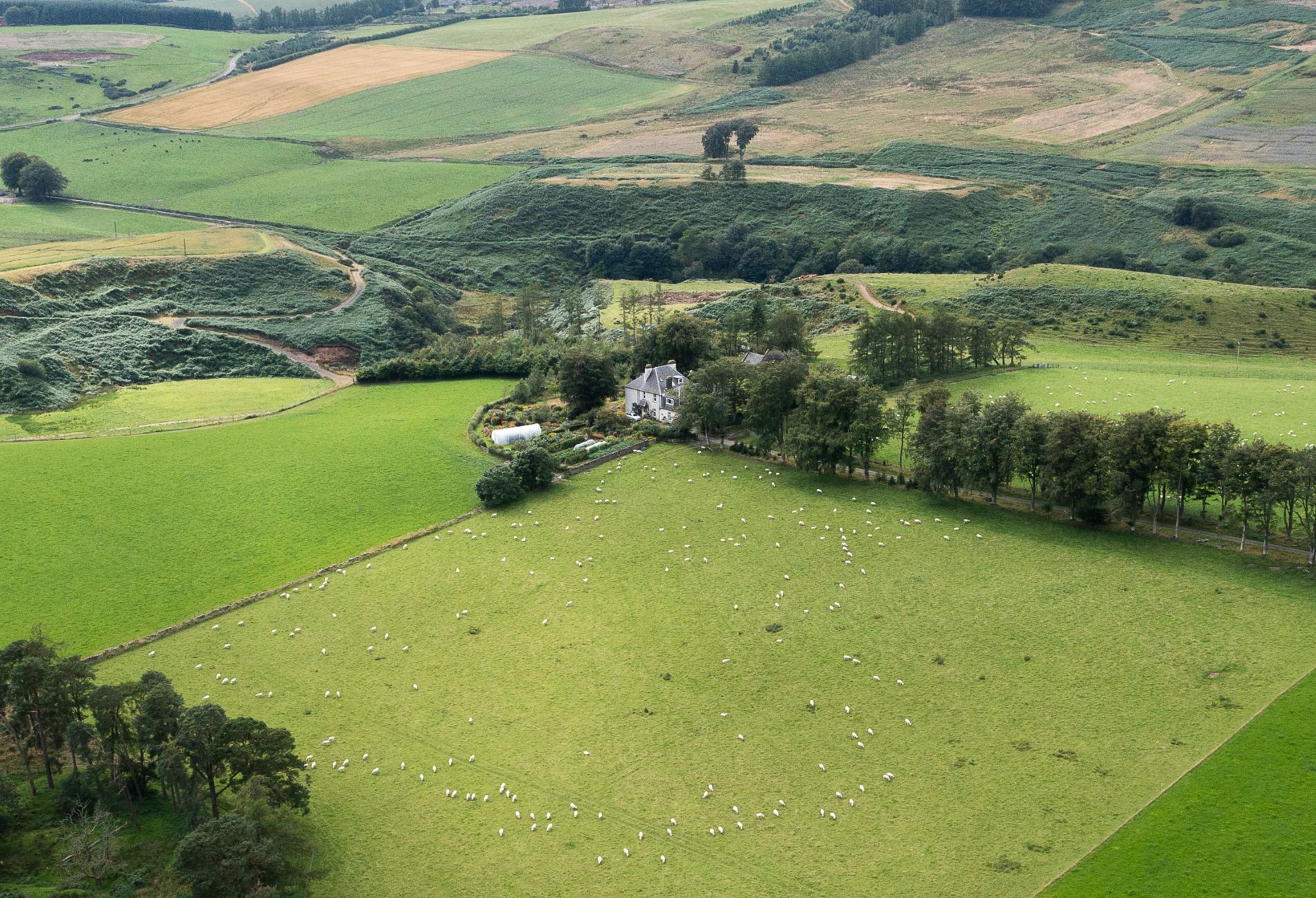 " />
" />